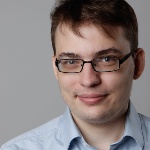Microwave devices and -systems often require selective absorption of stray radiation. While many properties and systems are well known for the commercially used microwave frequencies, the conditions of nuclear fusion necessitate the investigation of higher frequencies.
These high frequencies can not be generated easily by electrical components any more, instead a wave with an integer fraction of the frequency is generated by a network analyzer and subsequently sent into an harmonic multiplier to generate a wave with the desired frequency. It is then possible, to compare the interactions between this microwave and the investigated material with the interactions of the same microwave and a known reference to conclude material properties.
This technique becomes especially powerful, when using it at a large range of known parameters,
like thickness of the samples or the incident angle, and in a combination with simulations of the
internal interference effects of the
layer materials, allowing to conclude the parameters of the material and designing fusion
experiment components on demand.

Carsten Lechte
Dr. rer. nat.Leader, Microwave Technology

Andreas Hentrich M.Sc.
Ph.D. Student, Microwave Technology


